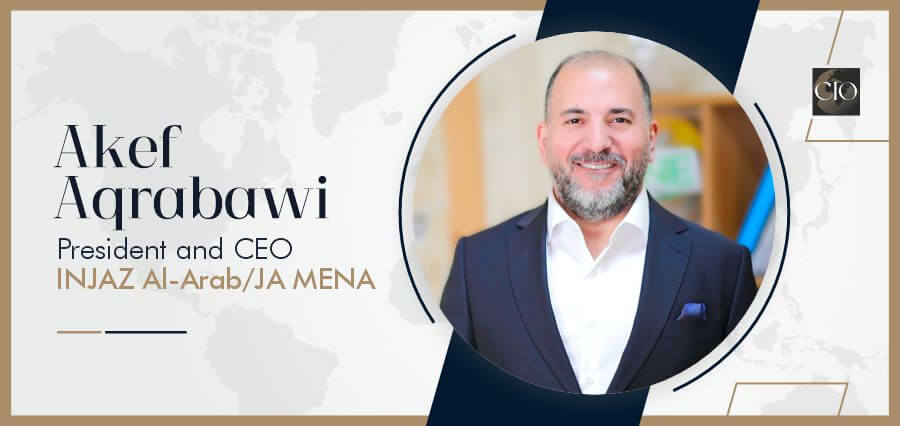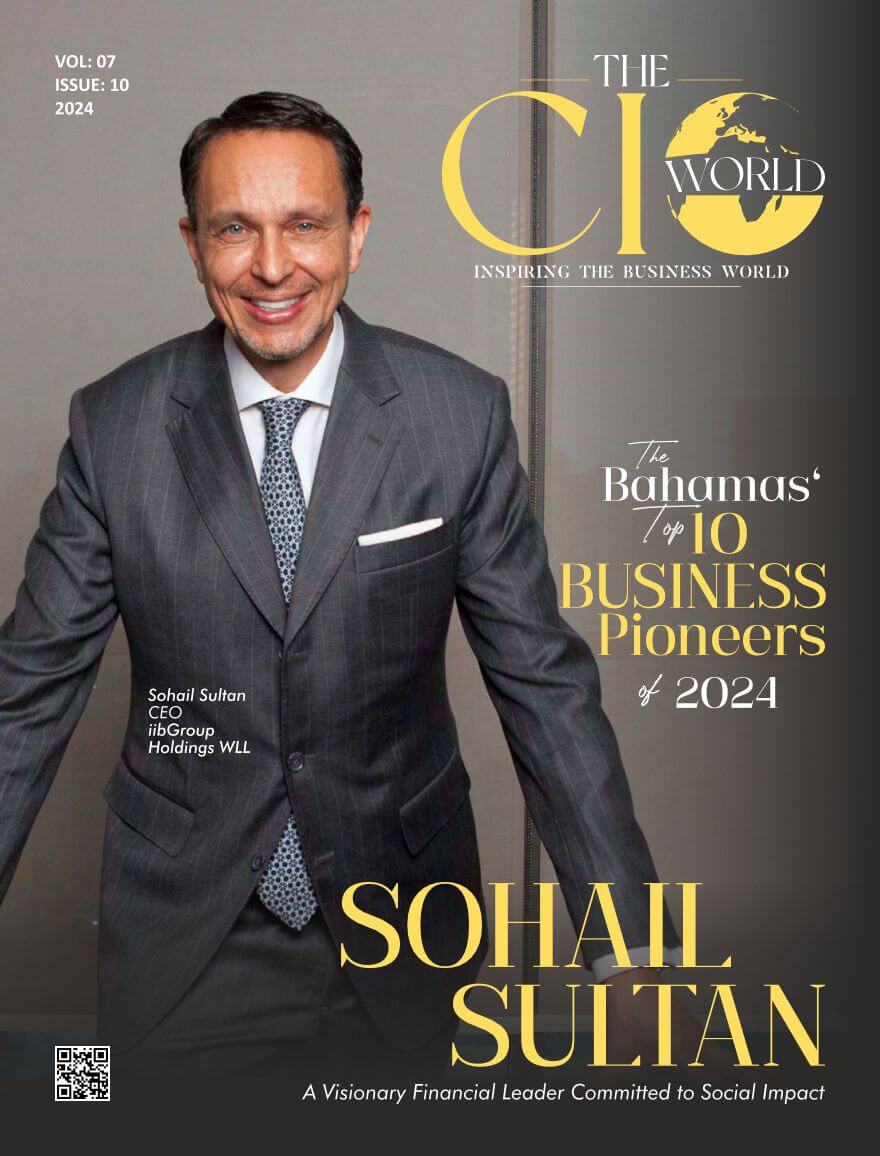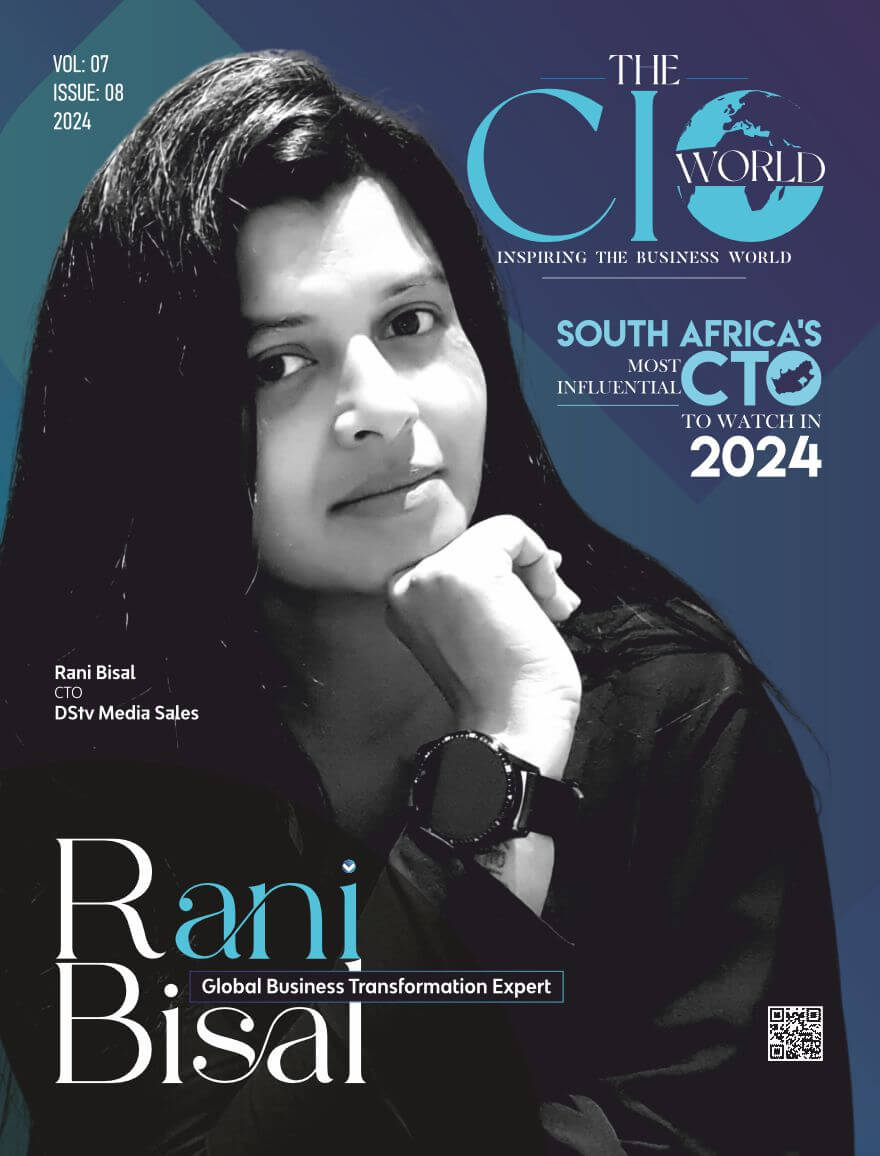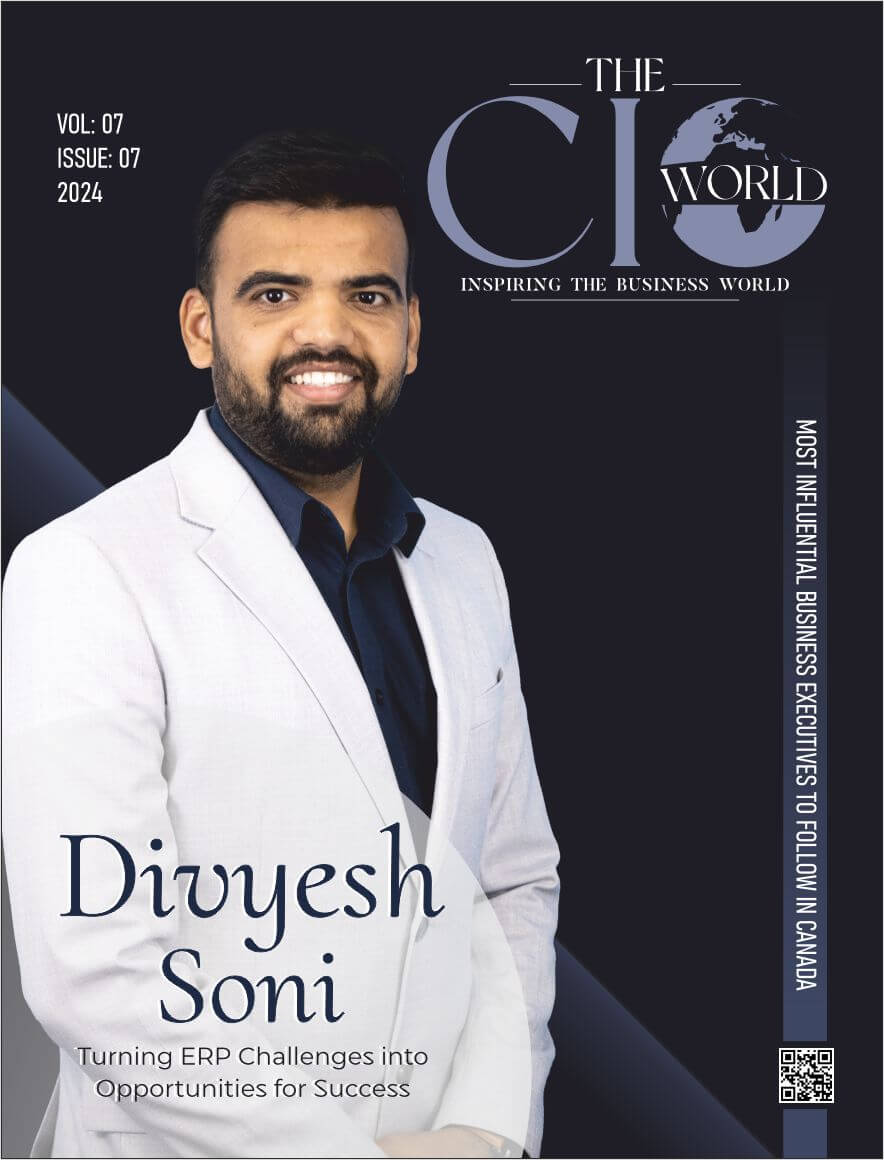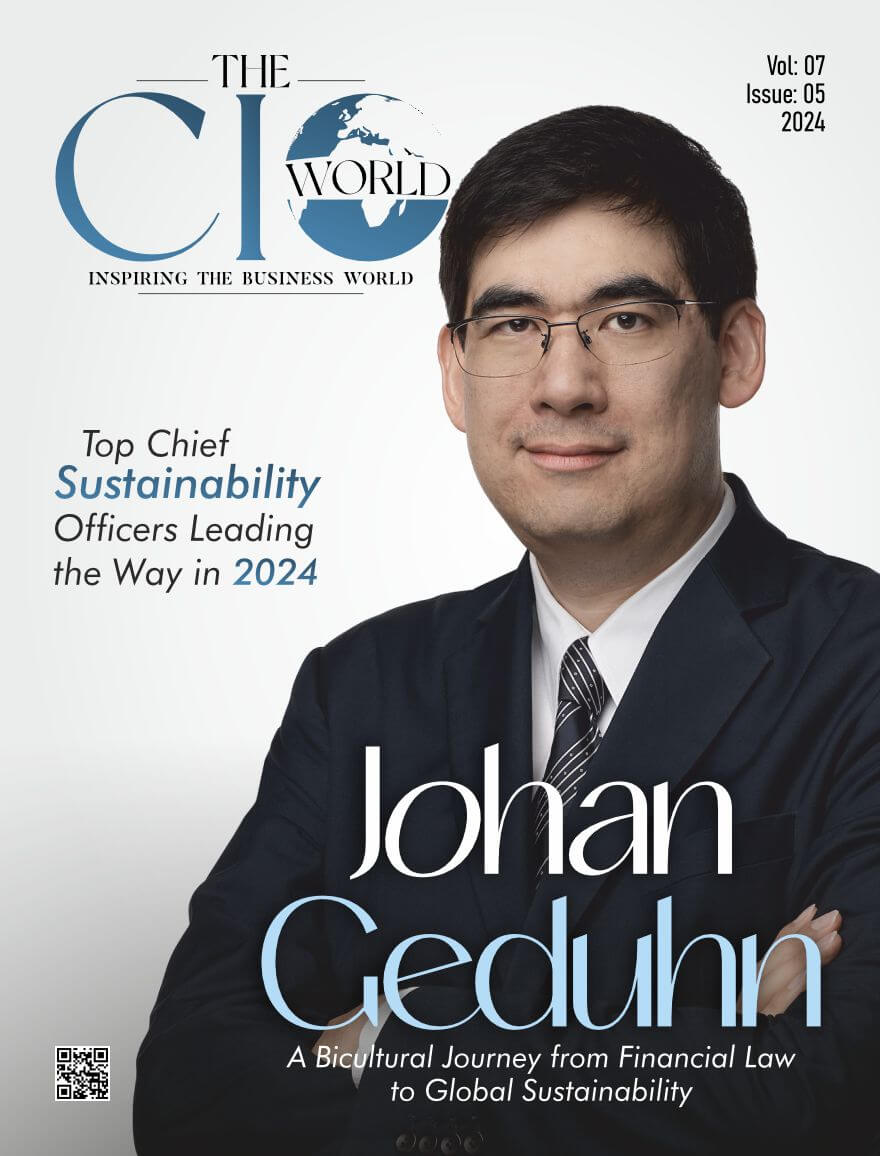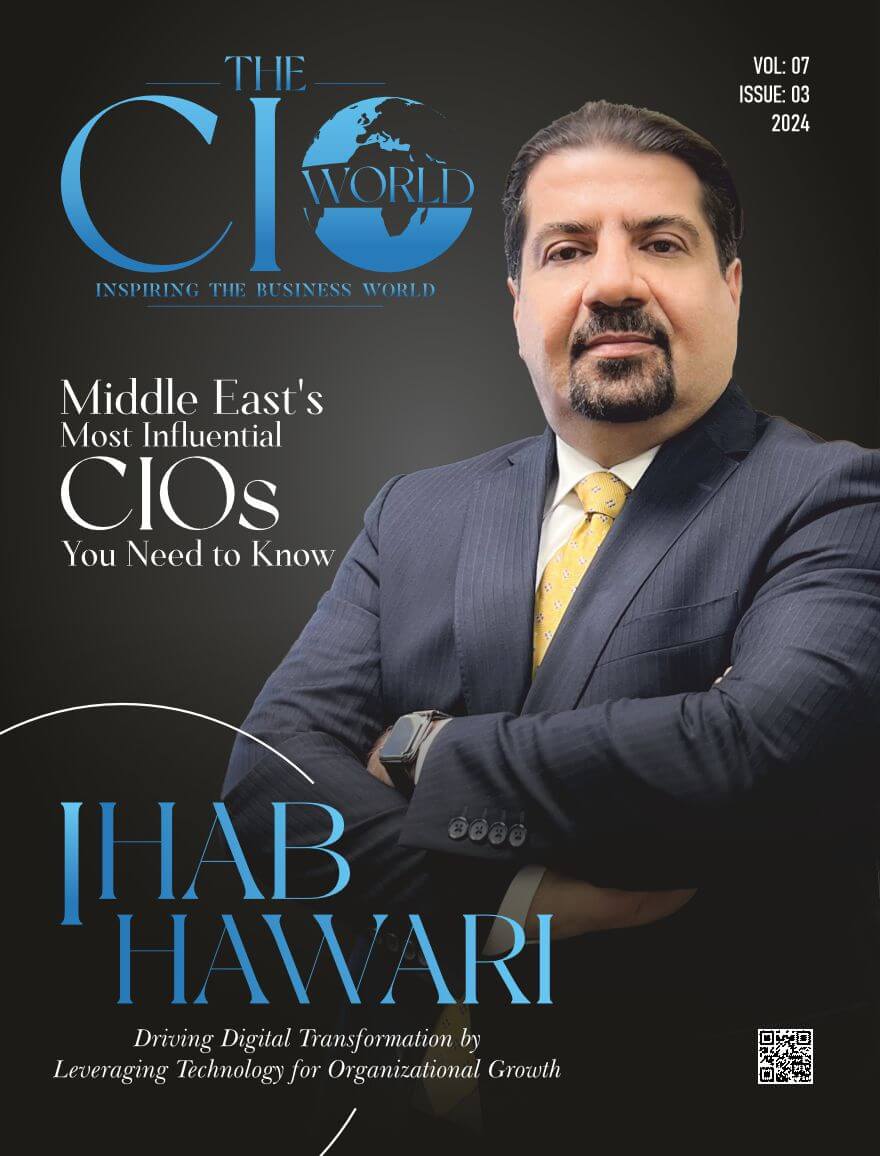Transforming Business Education Across 13 Countries by Creating Opportunities and Empowering Arab Youth!
The youth, with their boundless enthusiasm, breathe life into every environment they enter. Whether it’s in educational institutions, workplaces, or community spaces, their infectious energy becomes a catalyst for positive change. The mere presence of energetic young individuals can uplift spirits, fostering an environment where creativity flourishes and possibilities seem limitless.
This is the experience that Akef Aqrabawi had. As the President & CEO of INJAZ Al-Arab/JA MENA, he stands as a shining source of inspiration. His journey, spanning 25 years, is intertwined with the growth of an organization that has become a symbol of business education in 13 countries across the region.
Akef started his JA adventure a quarter of a century ago, when there was only one chapter in the MENA region. Beginning as an officer, he progressed through various roles, reaching the regional office in January 2005. This moment marked a turning point, aligning his vision with the late Soraya Salti, the Founder of INJAZ Al-Arab. Together, they had a clear goal: to expand INJAZ’s reach, creating a network that would change the landscape of business education.
The expedition commenced, and by 2012, they had established 13 national chapters, a testament to their unrelenting commitment. Akef looks back on that time with excitement, witnessing the growth of the network, the impact it had, and the immense opportunities that lay ahead. Driven by his natural passion, he recognizes the infectious enthusiasm he sees in the young people of the region, a force that propels INJAZ’s progress.
In the midst of this evolution, Akef’s determination was fueled by the potential he saw in Arab youth. Their passion and belief in the organization’s mission inspired him to strive for change. The story of INJAZ goes beyond business education; it’s about the deep impact of nurturing a generation empowered to shape its own destiny.
As Akef reflects on his career, it’s clear that his leadership played a pivotal role in steering the organization’s success. Through dedication, passion, and a belief in the potential of Arab youth, he not only witnessed the organization’s growth but also contributed to a transformative movement that continues to unfold, creating lasting change across the region.
Let us explore his exploration:
Pioneering a Legacy of Youth Empowerment
INJAZ began in 1999 with a humble number of students and volunteers. Like many other organizations, they faced numerous challenges along the way, but what sets them apart is their ability to transform those challenges into valuable learning experiences. Looking back on all these years, one feels proud to see how far they have come. As INJAZ approaches its 20th anniversary in 2024, it is important to acknowledge that INJAZ Al-Arab/JA MENA was one of the pioneers in fostering partnerships between the private and public sectors in this region. They were one of the very first organizations that ignited a good culture of entrepreneurship among young people, and that culture was not newly surfaced but deeply rooted in their organization, JA Worldwide, which has been empowering youth for over a century.
Overall, INJAZ Al-Arab/JA MENA has made a remarkable impact on the region. They have reached millions of students, trained thousands of volunteers, and collaborated with numerous organizations to cultivate a culture of entrepreneurship. Their pathway has been anything but easy, yet with unrelenting dedication, strong partnerships, and a steadfast belief in the potential of youth, they have been able to make a lasting difference and continue to do so every single day.
A Transformative Experience
Akef recalled a significant episode during the organization’s expansion across the region. In the initial phase, a pilot program was initiated in a public school within one of their chapters. The program, titled “Entrepreneurship Masterclass,” served as a crucial element in demonstrating the impact on young individuals. During this one-day event, students organized themselves into various groups, each assuming roles like CEO, VP for Marketing, production, finance, and more. At the end of the day, each group presented their ideas and products.
A memorable incident unfolded during the presentation by the Marketing VP student from one of the groups. His delivery was outstanding, leaving everyone in awe. A surprising revelation came when a school official sitting beside Akef leaned over and whispered, “What did you do to this student? He’s an academic failure.” The official was emphasizing that the traditional classroom setting had failed to uncover the student’s hidden talents. In a twist of events, the official went on to request the implementation of the program in every classroom within the school.
This particular instance resonated deeply with the INJAZ team, affirming that students, like the Marketing VP, harbored untapped talents waiting for an opportunity to shine. It underscored the organization’s commitment to providing such opportunities for young people across the region to unlock their potential.
Journey Toward One Million
In response to an ambitious goal of reaching over one million learning experiences annually by 2023, Akef explained that the emergence of this objective stemmed from various factors. It coincided with a critical period marked by escalating unemployment rates in a region predominantly inhabited by young people. Both the public and private sectors sought solutions for this pressing issue, and INJAZ recognized its role in addressing the need. A thorough assessment of market penetration rates revealed the imperative to expand numbers and acquire the necessary resources for sustainable growth.
Akef elaborated on the challenges faced during the journey, including structural obstacles such as a lack of funding and volunteers, particularly in non-serviced cities. Additionally, the region grappled with geopolitical challenges, economic hurdles, and disasters. Despite these adversities, INJAZ has continuously adapted to maintain a stable growth trajectory. The organization’s integration into the school curriculum and teacher empowerment’s determination and focus, coupled with collaboration with stakeholders, emerged as key success factors. INJAZ has consistently modified and improved its programs and tools, developing innovative strategies to efficiently meet market demands.
As a staff member involved in the growth journey from its early stages, he always viewed the one million goal as the ultimate achievement. However, upon reaching this milestone, he and his colleagues at INJAZ have come to realize that it serves as a cornerstone in their larger pursuit of something greater in the future.
MENA Region through Extracurricular Education
Since the onset of the year 2000, when INJAZ initiated its operations in the region, Akef has actively participated in numerous conferences addressing educational reform in the MENA region. The implementation of these reforms has proven to be a time-consuming process in some countries and unsuccessful in others. In recent years, a substantial influx of youth has entered the job market annually, seeking employment opportunities that are unfortunately scarce. Students may have dedicated themselves to their studies and performed due diligence, yet they find themselves without corresponding work opportunities.
INJAZ has played a crucial role in this scenario by exerting considerable effort in collaboration with other organizations to support the education system through extracurricular activities. These activities focus on life skills, business skills, and entrepreneurship skills, aligning with the market’s demands. INJAZ is perceived as an integral part of the education system’s overarching goals, working collaboratively in various chapters to serve and nurture youth.
In addition to offering INJAZ programs as extracurricular activities, it is actively engaged in integrating its curriculum with various ministries of education throughout the MENA region. This strategic shift aims to involve students in a more standardized format, providing distinctive and essential learning experiences across the four main pillars: entrepreneurship, financial literacy, work readiness, and STEM. This approach ensures that young individuals are equipped with unique skills and competencies from an early age and regularly.
Highlighting the importance of some of its extracurricular engagements with youth, for the past 14 years, the INJAZ Al-Arab flagship program, the Company Program, has enabled more than 147k high school and university students to experience the complete cycle of setting up and running their own enterprise through a dynamic 12-18 week business simulation program. With the assistance of private sector volunteers, youth form management teams, choose a business idea, raise capital, prepare a business plan, and market and sell their product or service. Upon completing the program, students from each member nation compete at the national and regional levels.
To sustain the momentum and expand direct access and channels to youth in the MENA region, INJAZ has ventured into new technological frontiers. It has embraced a new direction by establishing the first-ever regional platform for JA/INJAZ digitized programs, known as “INJAZ Campus.” This innovative digital platform empowers Arab youth in the MENA region with digital courses and developmental resources. The programs are available in English, Arabic, and French to cater to linguistic diversity from ages 5 to 24. The motivation for this initiative is not merely to follow a trend but to strategically reach more youth in locations where it has no physical presence.
Collaborations and Youth Empowerment
In describing the organization’s endeavors, Akef expressed that INJAZ Al-Arab has been refining its collaborative efforts through thought leadership within its ecosystem and among stakeholders. Drawing on fruitful partnerships and collaborations established with various entities over the years, the organization has ardently worked to guide strategic and opportune initiatives among all parties involved. This approach has enabled them to connect everyone with a shared vision and purpose, unequivocally leading to the empowerment and education of youth.
Its distinctive operational model incorporates the engagement of all stakeholders, including governments, educators, and the private sector. With a youth-centric approach, the organization consistently strives to bridge the gap between all collaborating parties.
It is noteworthy that INJAZ Al-Arab, aligning with JA Worldwide’s global strategic goals, aims to build upon cultivating partnerships for the purpose of growth in reach and impacting more youth across the region. Growth in impact is at the core of the shared mission, sustaining collaborations within the network.
Challenges Encountered
Akef highlighted this by stating that the inception of INJAZ Al-Arab was not as smooth as anticipated. Despite a significant need for JA/INJAZ in a region teeming with a youth population, the idea of reaching one million arose from the necessity to penetrate markets and attract stakeholders to support INJAZ. Crucially, the region was eager to embark on something substantial, seeking quick wins and solutions for youth entering the marketplace in search of scarce opportunities in both the private and public sectors.
Structural challenges emerged as Akef and the team communicated this ambitious goal. Two to three years later, they realized that a top-down approach was ineffective. Instead, they needed to address the structural challenges their member nations faced, opting for a bottom-up approach that would better understand the capabilities and weaknesses of their MNs, allowing them to focus on addressing those weaknesses.
The Arab Spring proved to be another pivotal moment for INJAZ Al-Arab. Their operations were affected as schools and universities suspended their activities. Consequently, all outreach efforts, impact, and numbers suffered, compounded by the funding challenge. Interestingly, in the aftermath, it became apparent that funding would continue to be a challenge. On the contrary, the private sector recognized a long-ignored mistake: that youth were enduring economic and political hardships, necessitating significant support. Organizations like INJAZ thus became crucial in bridging the gap and expanding the idea of hope, demonstrating that the youth can design their own futures.
Additionally, the onset of the COVID-19 pandemic took its toll on INJAZ Al-Arab globally. Despite the collective tragedy, their network made a significant shift to digital, swiftly fulfilling promises and commitments to donors and young people in the region. The new digital model allowed them to fast-track their goal, reaching more students, establishing long-term learning journeys, creating communities across the region, and enabling it to sustain long-term growth.
Vision for Youth Empowerment and Innovation
Akef illustrates his perspective by stating that he and his team acknowledge that their role extends beyond merely equipping youth with life skills. They recognize the importance of upskilling and reskilling to meet evolving market needs. He envisions that creating more learning experiences and establishing additional touchpoints with youth in the future will necessitate a network dynamic that is more resilient to change, adaptation, and innovation.
Over the past three years, Akef and his team have achieved significant growth, attributing it to various enablers such as strategic partnerships for growth and an expanded reach in elementary education, activating these enablers, allowed the organization during the academic year 2018-2019, to reach half a million students. Additionally, and to sustain growth and impact, INJAZ collaborates with leading technology companies, ensuring the continuous integration of technology into their programs and delivery methods.
As highlighted, INJAZ takes pride in being the pioneer of the first digital platform that offers educational programs for individuals aged 5–24, encompassing various delivery models, including self-paced learning.
Corporate Contributions to Youth Empowerment
When asked about the potential for the private sector to play a more substantial role in supporting youth empowerment and entrepreneurship initiatives in the MENA region, Akef responded with a strategic perspective. He underscored the significance of fostering partnerships for growth, a strategic goal on both regional and global levels. This approach, he noted, is not only crucial for the success of INJAZ but for the entire JA network and is ingrained in the organization’s DNA. According to him, the key to reaching more young people in the future lies in fortifying existing partnerships and pursuing untapped opportunities that promise to amplify their impact.
Beyond mere financial contributions, Akef highlighted the broader role that the private sector can play in realizing the vision of empowered youth. The private sector, he asserted, provide the necessary support to diversify programs, such as the incorporation of STEM, technology, sustainability, and AI. He emphasized the importance of maintaining consistency in the vision of youth empowerment, not just as a governmental or national priority but as a central theme for the private sector as well. In conclusion, he stressed the imperative of enduring focus to ensure that youth empowerment remains a steadfast commitment.
Integration into the School Curriculum & Teacher Empowerment
Akef expressed, “One of the goals is to incorporate INJAZ into the school day and provide our teachers with essential skills. It’s a mutually beneficial situation where we invest more in our teachers.” Drawing upon extensive experience, he highlighted the significant role teachers can play alongside the business community. The organization, committed to fostering a culture of creativity, inclusion, and collaboration, believes in the responsibility of skilling young people. He then stated, “We aim to educate them to take ownership of their economic success in a future where talent must be coupled with vision, passion, and resilience.

